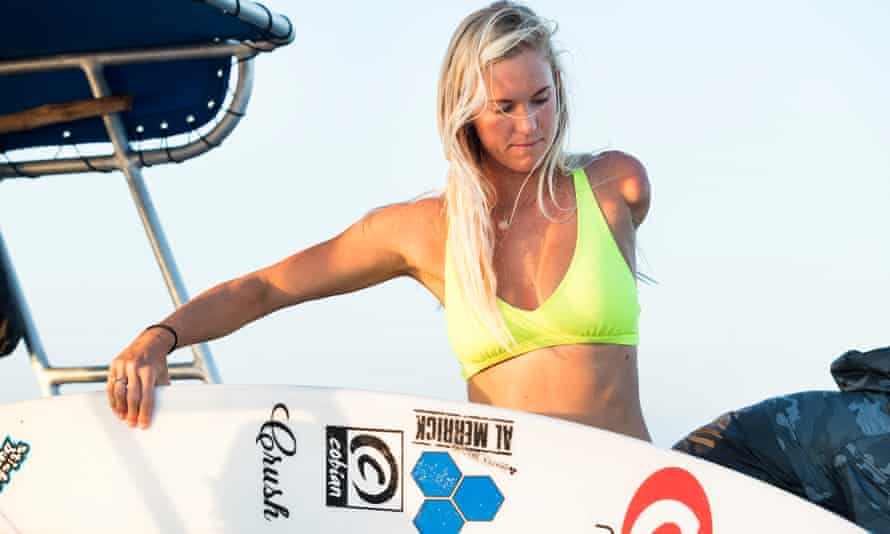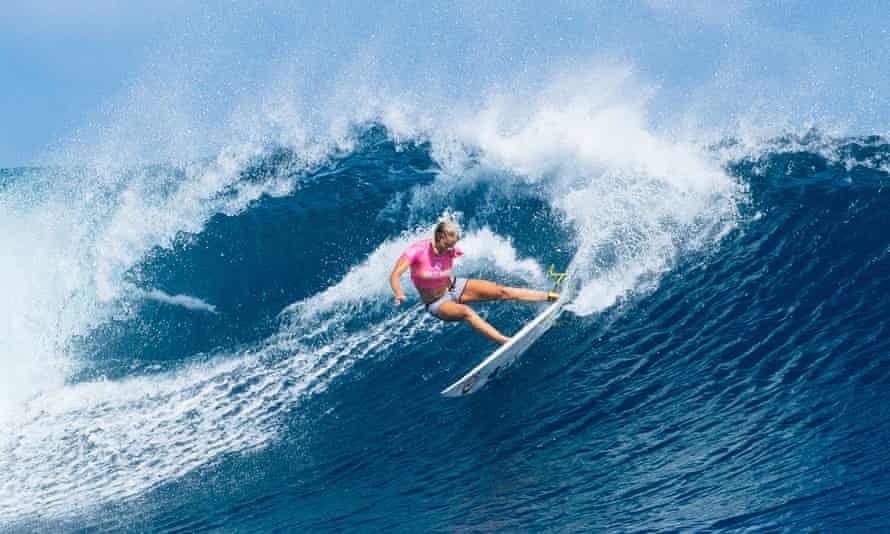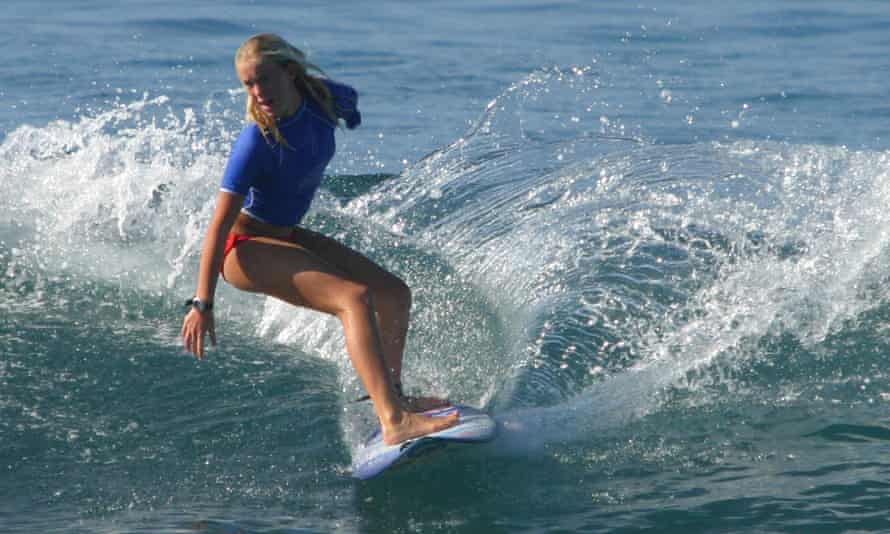Will Do the Water at the Espy Again
In Bethany Hamilton's mind, winning the ESPY award for best female athlete with a disability would have been like "rewinding back to square one".
Square one being the fateful day 13 years ago when she was attacked by a 14ft tiger shark and lost her left arm. Which is why, this year, she withdrew her name from consideration.
Hamilton, now 26 and one of the most well-known surfers in the world, has overcome substantial challenges in pursuing her dreams as a professional surfer. But she says the hardest thing she still struggles to adapt to is the way others perceive her and treat her.
"It's funny," she chuckled, "when I first heard I was going to be nominated for an ESPY the first thing I thought was: 'Whoa, I'm going to be up for best female action sports athlete!' It didn't even occur to me that I was going to be placed in the disabled division … I don't surf disabled or compete in a disabled category."
Hamilton's comment follows Serena Williams' statement at Wimbledon that she preferred the phrase "one of the greatest athletes of all time" to "one of the greatest female athletes of all time".
The nomination came on the heels of her best performance to date in a World Surfing League (WSL) competition. In May, she took third place in the Fiji Women's Pro Competition. In the process, she beat six-time world champion Stephanie Gilmore and current top-ranked surfer Tyler Wright. She also landed her first WSL Big Wave award nomination this year for her performance on the wave Jaws in Maui in January, just six months after giving birth to her first child.
Her performances left her peers in awe.

"The hardships she overcomes to perform at the level she does in the ocean is arguably unparalleled in men's or women's sport," surfing legend Kelly Slater said of her performance in Fiji. "I think everyone should have a full surf with one arm strapped to their side and attempt not only to paddle out but put themselves in position at heavy spots like Pipe, Jaws, and Cloudbreak, and try to get up on a short board. I'm scared to try it myself and ridiculously impressed with her talents."
To Hamilton, the fact that she surfs with one arm is irrelevant.
"I don't look at it like, 'Wow, I did a really good job with one arm.' It's just, 'Wow, I did a good job on that wave.'"
To compensate for her lost arm, Hamilton has to paddle twice as hard and kick with her feet. She drops into waves later than most because she can't generate enough power to drop into waves at the same point as most surfers would. She has a handle on the front of her board to help her duck dive, but even then, she can't always make it under large waves.
She doesn't deny that she has some unique challenges, and she's embraced the opportunity to inspire others, including with her not-for-profit group Friends of Bethany, which supports other amputees. So it was with great hesitation that she considered asking the ESPYs to withdraw her nomination. Ultimately, the decision came down to her feelings about the wording.
"I think disabled is a very degrading title for athletes," she said "I feel like I'm an incredibly abled person ... If anything, I encourage ESPYs to … change the category to Best Adaptive Athlete, so athletes that have adapted to unique situations in their life. I would have been stoked to be in the category if that was what it was called."

Growing up on the north shore of Kauai, Hamilton was born into the classic dirtbag-surfer lifestyle. Her father was a waiter and her mother cleaned rental condos, earning just enough to cover the bills so they could chase the next wave.
Whether it was nature or nurture, her parents' predilection for surfing manifested in Hamilton at a young age. When she was eight, she competed in her first competition. At nine, Rip Curl became her first real sponsor. In the following years, she competed in multiple events. At age 13, she placed second in the NSSA national championships.
But her promising career seemingly came to a halt on 31 October 2003. Bethany was surfing with her best friend, Alana Blanchard. At first, Hamilton didn't realize what had happened. She saw a grey flash and felt a short tug. But when she looked down, the water was bright red and her left arm and a large chunk of her surfboard were missing.
"I've just been attacked by a shark," she stated calmly, and started paddling towards the shore with one arm. Alana's father used his surf leash as a tourniquet and rushed her to the nearest hospital. Local fishermen captured the 14ft tiger shark, surfboard debris still lining its mouth.
The story of the attack and a 13-year-old girl's crushed dream of pro surfing captured the media's attention on a rubbernecking level. But when Hamilton returned to the water just one month later, her tenacity garnered national attention.
She soon realized the opportunity she had to inspire others, and found new purpose in helping others with her story. Though she was uncomfortable in the limelight.
In her autobiography, she bemoaned, in true teenage angst, that interviews were boring and got in the way of surfing. But Hamilton still managed to find time to train. In 2004, she competed in the NSSA national championships just one year after the attack. She won an ESPY award for Best Comeback Athlete.

Over the next few years, Hamilton continued to surf and compete, acquiring a collection of various wins. And then, for the most part, things went quiet, with several years passing without a single win.
In 2011, the movie Soul Surfer was released, and she traveled to promote it. It seemed her competitive drive had begun to wind down.
But in 2014, something changed. Just a few months after marrying her husband, Adam Dirks, she took home first place in the Pipeline Women's Pro competition. In an interview with People magazine, she credited her husband with reigniting her competitive spark and encouraging her to keep developing her talent. Later that year, she found out she was pregnant with her first child.
She delivered her son, Tobias, in June 2015. But having a child didn't hold her back from training. If anything, Hamilton says her training has picked up a notch. "Now I only have windows of time to train and surf," Hamilton remarked over the clamor of pots and pans. Tobias was in the kitchen, emptying her cupboards onto the floor. "I want to make the most of it, so I feel like I'm wiser with my time now."
Three months after Tobias was born, Hamilton competed in the WSL Swatch Women's Pro as a wildcard and came in 13th. "I kind of had a rough go," she admits, trying to hide her disappointment, "but it was a good learning experience, and I look back at it going, 'Yeah, not too much pressure four months after giving birth.'"
Hamilton noted that it's much less common for female surfers to continue the sport competitively once they have a family. None of the women on the world championship tour are married or have children.
But she doesn't believe mothers have to sacrifice competitive surfing, and adds that her husband's support as a stay-at-home dad allows her to continue surfing professionally while raising their child.
Hamilton came back even stronger in 2016 with her performance at Jaws and in the Fiji Pro. She hopes to have another chance at the Swatch Women's Pro competition this coming September.
Despite a supportive husband and new opportunities to compete, Hamilton says she isn't trying to qualify for the world championships anytime soon. All her time and effort are currently going into her new documentary, Surfs Like a Girl.
The film covers the challenges in her life as an athlete and mother, but the primary focus will be capturing high quality footage of Hamilton surfing. Hamilton said many of her fans are unaware that she can actually surf at the level she does.
"It's almost like my surfing has been overshadowed by being a shark attack survivor and being known as Soul Surfer," she lamented.
For Hamilton, the project offers an opportunity to make her aquatic abilities known, while still sparking something in her young fans.
"It's a different sort of inspiration," she says, chuckling softly and hugging her knees to her chest with her arm. "Instead of 'Whoa, she surfs with one arm!' It's 'Whoa, she rips, I wanna be like her!'"
Source: https://www.theguardian.com/sport/2016/aug/25/bethany-hamilton-surfing-espy-award